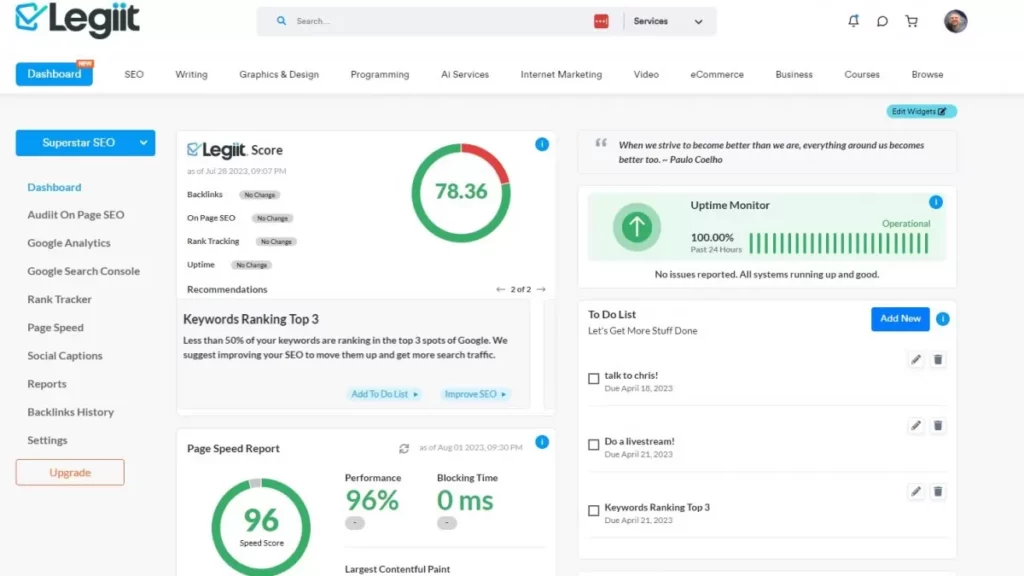Law Firm SEO – How To Find The Best Law Firm SEO Expert
Law Firm SEO, a widely discussed topic in the legal profession, has garnered attention due to its potential to enhance online visibility and attract clients. This article aims to guide finding the best Law Firm SEO expert who possesses the necessary expertise to optimize digital marketing strategies for law firms.
By examining the benefits, elements, and types of SEO services available and providing tips and tools for effective implementation, this article will equip legal professionals with the knowledge required to make informed decisions in their quest for optimal online presence.
Key Takeaways
-
Law firm SEO is crucial in the digital age as it enhances online visibility and search rankings, attracts a wider audience of potential clients, and gives a competitive advantage in the legal industry.
-
SEO services for Law Firms involve various techniques such as keyword research, on-page optimization, technical optimization, and link building, which contribute to improved online reach and audience.
-
Crafting a well-rounded keyword strategy is essential for Law Firm SEO, considering factors like long-tail and short-tail keywords, competition analysis, and gauging keyword difficulty.
-
Local SEO is important for Law Firms as it helps optimize websites for local searches, manage citations and business listings, engage in local content marketing and community outreach, and track and monitor local SEO performance.
What Is Law Firm SEO?
Law Firm SEO refers to optimizing a law firm's website and online presence to increase its visibility and ranking in search engine results pages. It involves strategies such as keyword research, on-page optimization, link building, and content creation.
The ultimate goal of law firm SEO is to attract more organic traffic to the website, which can lead to increased brand awareness, client acquisition, and overall business growth.
By implementing search engine optimization techniques, SEO companies can help law firms improve their online visibility, outrank competitors, and establish themselves as authorities in their legal fields.
Investing in law firm SEO is crucial in today's digital age, where potential clients often turn to search engines to find legal services.

Why You Should Invest in Law Firm SEO
Investing in search engine optimization (SEO) strategies specifically tailored for law firms can enhance online visibility, improve organic search rankings, and ultimately attract a wider audience of potential clients. In today's digital age, having a strong online presence is crucial for any business, including law firms.
SEO techniques help law firms optimize their websites to appear higher in search engine results when potential clients search for relevant keywords.
Law firms can increase their chances of being found by people actively looking for legal services. This can lead to a higher volume of targeted organic traffic, resulting in more potential clients.
Therefore, investing in law firm SEO can significantly benefit law firms by expanding their online reach and attracting a larger audience of potential clients.
What Are SEO Services for Law Firms?
Optimizing websites for higher search engine rankings and increased online visibility is a key aspect of digital marketing strategies for legal service providers. SEO services for law firms encompass a range of techniques and practices to improve the website's visibility in search engine results pages (SERPs).
These services often involve keyword research, on-page optimization, technical optimization, link building, and content creation. Keyword research helps identify the most relevant and competitive keywords that potential clients may use when searching for legal services.
On-page optimization involves optimizing website elements such as title tags, meta descriptions, and header tags. Technical optimization focuses on improving website speed, mobile responsiveness, core web vitals, and site architecture.
Link building aims to increase the website's authority and credibility by acquiring high-quality backlinks from reputable sources. Content creation involves producing informative, engaging, and relevant content that attracts and engages potential clients.
How Law Firms Can Benefit from SEO Services
One of the advantages of utilizing SEO services is that it can enhance a legal service provider's online visibility and attract a more targeted audience. With the increasing competition in the legal industry, law firms must adopt effective strategies to stay ahead.
Here are four key benefits of SEO services for law firms:
-
Increased organic traffic: SEO helps law firms rank higher in search engine results, leading to increased visibility and organic traffic to their websites.
-
Improved website usability: SEO involves optimizing website structure, navigation, and content, resulting in a better user experience for visitors.
-
Enhanced brand credibility: When a law firm appears on the first page of Google search results, it instills trust and credibility in prospective clients.
-
Higher conversion rates: SEO targets relevant keywords and optimizes website content, making it more likely for users to convert into clients.
Elements of Law Firm SEO Services
An essential aspect of effective law firm SEO services is strategically selecting and utilizing relevant keywords to optimize website content and improve search engine rankings. By conducting thorough keyword research, law firms can identify the specific words and phrases that potential clients use when searching for legal services online.
These keywords can then be strategically incorporated into the website's content, including page titles, meta descriptions, headers, and body text. Additionally, law firms can leverage local keywords to target specific geographic areas and attract clients in their target market.
Law firms can increase their visibility on search engine results pages and attract more organic traffic. This, in turn, can lead to higher conversion rates and, ultimately, more clients for the firm.
What Practice Areas Can Benefit from SEO Services for Law Firms?
Different practice areas within the legal field can benefit from implementing SEO services for law firms. SEO, or search engine optimization, is optimizing a website to improve its visibility and ranking on search engine results pages.
By applying SEO strategies, law firms can increase their online presence, attract more potential clients, and establish themselves as authorities in their practice areas.
The following practice areas can particularly benefit from SEO services:
-
Personal Injury: SEO can help law firms target local keywords and improve their visibility to potential clients searching for legal representation after an accident or injury.
-
Family Law: SEO can assist family law firms in reaching individuals looking for divorce attorneys, child custody lawyers, or assistance with other family law matters.
-
Criminal Defense: SEO can help criminal defense law firms target keywords related to specific criminal charges, allowing them to reach individuals needing legal representation.
-
Estate Planning: SEO can assist estate planning law firms reach individuals searching for wills, trusts, and estate administration assistance.
-
Immigration Law: SEO can help immigration law firms target keywords related to visa applications, green cards, and other immigration services.

Choosing the Right SEO Service Provider for Your Law Firm
Selecting the ideal SEO service provider for your law firm is a crucial decision that can significantly impact your online visibility and client base. To ensure a fruitful partnership, consider the following steps:
-
Define Your Goals: Clearly outline your law firm's objectives. Whether it's increased website traffic, higher search rankings, or specific practice area visibility, a focused goal will guide your search.
-
Industry Experience: Look for an SEO company with a proven track record in legal SEO. Legal nuances require expertise; an experienced provider understands the complexities of legal terminology, compliance, and target audience.
-
Client References: Request client references and case studies. Genuine success stories and satisfied clients speak volumes about the capabilities of the SEO agency.
-
Tailored Strategies: A reputable provider should create a customized strategy that aligns with your firm's goals and practice areas. Avoid generic approaches that fail to address your unique needs.
-
Ethical Practices: Ensure the provider follows ethical SEO practices, abiding by industry regulations and guidelines. Unethical tactics can harm your online reputation and legality.
-
Transparent Reporting: Transparency is key. The provider should offer regular performance reports that outline progress, traffic, and conversions. Open communication builds trust.
-
Proven Results: Evaluate their results for previous clients. Consistent improvement in search rankings, organic traffic, and lead generation are indicators of a competent provider.
-
Comprehensive Services: Look for a provider that offers a range of SEO services, including on-page optimization, content creation, link building, local SEO, and technical enhancements.
-
Up-to-date Knowledge: SEO evolves; your provider should stay updated with algorithm changes and trends to maintain effective strategies.
-
Communication Skills: Effective communication is essential for collaboration. Choose a provider that explains complex concepts in a clear, understandable manner.
-
Pricing Structure: Avoid providers with overly cheap or exorbitant prices. A reasonable pricing structure should reflect the value and expertise they bring.
-
Long-term Perspective: SEO is a continuous effort. Choose a provider willing to work with you over the long term, adapting strategies as needed.
-
Innovation: The digital landscape is dynamic. Look for a provider that embraces innovation and is open to exploring new tactics and tools.
-
Compatibility: Cultural fit matters. Your provider should understand your firm's ethos and align with your values.
-
Trial Period: Consider starting with a shorter contract or trial period to evaluate the provider's performance before committing long-term.
What Do Law Firm SEO Specialists Do?
Law firm SEO specialists are responsible for optimizing websites for improved visibility and ranking on search engine results pages, utilizing strategies tailored to the legal industry. Also, a lawyer SEO expert should offer a comprehensive SEO guide to the client.
They are crucial in ensuring law firms can attract potential clients and compete effectively in the online marketplace.
Here are three key tasks that law firm SEO specialists undertake:
-
Keyword research and optimization: They conduct in-depth research to identify the most relevant keywords and phrases potential clients use when searching for legal services. They then optimize website content, including blog posts, landing pages, and meta tags, to incorporate these keywords and improve organic search rankings.
-
On-page optimization: Law firm SEO specialists optimize various on-page elements, such as headings, URLs, and image alt tags, to make them more search engine-friendly. This helps search engines understand the website's content and relevance, improving its visibility and ranking.
-
Link building: They develop and implement effective link-building strategies to increase the number and quality of inbound links to the law firm's website. This enhances the website's authority and credibility in the eyes of search engines but also drives referral traffic and boosts its overall visibility.
SEO Services for Lawyers
It will examine the importance of high-value keywords in law firm SEO, highlighting their ability to attract targeted traffic and generate quality leads.
The debate between long-tail and short-tail keywords will be examined, considering their advantages and disadvantages regarding search volume and competition.
Find the Best Keywords for Law Firms
Keywords are crucial in optimizing law firm websites for search engines and attracting relevant traffic. Regarding law firm SEO, finding the best keywords is essential for ranking higher in search engine results pages (SERPs) and reaching the target audience effectively.
Law firms need to identify keywords that are relevant to their practice areas and have high search volumes and low competition. This requires a thorough understanding of the legal industry, the target audience, and keyword research tools.
By selecting the right keywords, law firms can increase their online visibility, drive organic website traffic, and generate more leads and conversions.
The Importance of High-Value Keywords in Law Firm SEO
The significance of selecting high-value keywords for optimizing websites and attracting relevant traffic in the legal industry cannot be overstated. To optimize a law firm's website effectively, it is crucial to identify keywords with high search volume relevant to the legal services offered.
Here are three reasons why high-value keywords are essential in law firm SEO:
-
Increased visibility: By targeting high-value keywords, law firms can rank higher in search engine results pages (SERPs), leading to increased website visibility and organic traffic.
-
Relevance to target audience: High-value keywords help law firms attract the right audience – potential clients actively searching for legal services, increasing the likelihood of conversions.
-
Competitive advantage: Selecting high-value, less competitive keywords than generic terms enables law firms to stand out from competitors and capture a niche market.
Long-Tail Keywords vs Short-Tail Keywords
A comparison between long-tail and short-tail keywords in the context of law firm SEO reveals distinct characteristics and implications for search engine optimization strategies.
Long-tail keywords are longer and more specific phrases that target a niche audience, while short-tail keywords are shorter and more generic terms with broader appeal.
Regarding law firm SEO, long-tail keywords are advantageous as they can attract highly targeted traffic and have less competition. They allow law firms to focus on specific practice areas and niche markets, leading to higher conversion rates.
On the other hand, short-tail keywords have higher search volumes but are more competitive, making it harder for law firms to rank higher in search engine results.
Analyzing the Competition and Gauging Keyword Difficulty
To effectively assess keyword difficulty and competition, it is crucial to conduct a comprehensive analysis of the current market landscape and evaluate the strategies employed by competitors.
This involves analyzing search volume, keyword relevance, and domain authority.
Here are some key steps to consider when gauging the keyword difficulty and competition:
-
Research the top-ranking websites for the target keywords and evaluate their content quality and relevance.
-
Assess the backlink profiles of competing websites to understand their authority and link-building strategies.
-
Analyze the search engine results pages (SERPs) to determine the level of competition and identify potential opportunities.
-
Utilize keyword research tools to gather data on search volume, competition metrics, and related keywords.
Crafting a Well-Rounded Keyword Strategy for Law Firms
Having analyzed the competition and gauged keyword difficulty, the next step in optimizing a law firm's SEO is to craft a well-rounded keyword strategy. This involves selecting relevant keywords that align with the firm's practice areas and target audience.
A comprehensive keyword strategy should include a mix of high-volume, high-competition keywords and long-tail keywords that are less competitive but more specific to the firm's services. By targeting diverse keywords, a law firm can increase its visibility in search engine results and attract a wider audience.
Conducting thorough keyword research to identify emerging trends and opportunities within the legal industry is essential. This will help the firm stay ahead of the competition and adapt its SEO strategy accordingly.
Write Attorney Website SEO Content
Crafting attorney website SEO content involves carefully selecting and incorporating relevant keywords and creating informative and engaging content that caters to the target audience's needs. A well-executed keyword strategy is crucial for optimizing website visibility and attracting organic traffic.
To achieve this, legal professionals must conduct thorough keyword research, identify high-ranking keywords that align with their practice areas and target audience, and strategically integrate them into their website content.
It is essential to create informative and engaging content that provides value to the readers. By offering valuable insights, addressing common legal concerns, and answering frequently asked questions, attorneys can establish themselves as authoritative figures in their respective fields.
This improves their website's search engine ranking and helps build trust and credibility with potential clients.
On-Page SEO
On-page SEO techniques are crucial to optimize a law firm website for search engines. On-page SEO refers to optimizing individual web pages to improve their search engine rankings and attract more organic traffic. It involves various factors such as keyword research, content optimization, and technical optimizations.
When it comes to on-page SEO for law firm websites, there are several key strategies that can be implemented:
-
Keyword research: Identify relevant keywords and phrases that potential clients may use when searching for legal services. Use keyword research tools to find high-volume and low-competition keywords. Include these keywords naturally within the website's content and meta tags.
-
Content optimization: Craft informative, engaging content that resonates with the target audience. Focus on creating valuable content that addresses common legal concerns and questions. Ensure the content is well-structured, easy to read, and optimized for relevant keywords.
Crafting Compelling Titles, Headers, and Meta Descriptions
Titles, headers, and meta descriptions play a crucial role in enhancing the visibility and click-through rates of a law firm website. These elements serve as a concise summary of the content presented on a webpage, providing users with a preview of what they can expect.
Crafting compelling titles, headers, and meta descriptions requires careful consideration of the target audience and the keywords relevant to the law firm's practice areas.
It is essential to create titles that accurately reflect the content and are enticing enough to capture the attention of potential clients. Headers should be well-organized and hierarchical, allowing users to navigate the website easily.
Meta descriptions should concisely overview the page's content and include relevant keywords to improve search engine rankings. By effectively optimizing these elements, law firms can improve their online visibility and increase click-through rates, ultimately driving more traffic to their website.
Optimizing Content and Internal Linking
When optimizing content and internal linking for law firm SEO, several key strategies can help improve website visibility and ranking on search engine results pages (SERPs).
First, conducting thorough keyword research is essential to identify relevant and high-ranking keywords that can be incorporated into the content.
Additionally, creating high-quality and informative content that provides value to users is crucial. This includes using proper formatting, incorporating relevant headers and subheadings, and ensuring the content is well-structured and easy to navigate.
Lastly, a strong internal linking strategy can help search engines understand the website's architecture and improve the user experience. By interlinking relevant pages and using descriptive anchor text, law firm websites can enhance their SEO performance.
Off-Page SEO (Backlinks)
One effective strategy for improving website visibility and ranking on search engine results pages involves focusing on off-page SEO factors, specifically building quality backlinks.
Off-page SEO refers to the actions taken outside of a website to improve its search engine ranking.
Quality backlinks are hyperlinks that point from one website to another. They are considered an important off-page SEO factor because search engines like Google see them as a vote of confidence for a website's credibility and authority.
When reputable websites link to a particular website, it signals to search engines that the linked website is reputable and trustworthy. Quality backlinks can help increase a website's visibility, improve its search engine ranking, and drive more organic traffic.
The Importance of Quality Backlinks in Off-Page SEO
The importance of quality backlinks in off-page SEO lies in their ability to signal to search engines the credibility and authority of a website. Backlinks serve as endorsements from other websites, indicating that the content on the linked website is valuable and trustworthy.
For law firm websites, quality backlinks are crucial in establishing the firm's expertise and reputation in the legal field. Here are five reasons why quality backlinks are important in off-page SEO for law firm websites:
-
Increased visibility and organic traffic
-
Enhanced credibility and authority
-
Higher search engine rankings
-
Targeted referral traffic from relevant websites
-
Improved brand awareness and recognition
Strategies To Acquire High-Quality Backlinks for Law Firm Websites
Implementing effective strategies for acquiring high-quality backlinks is crucial for enhancing the online visibility and credibility of websites belonging to law firms.
One strategy is to create high-quality, informative content that naturally attracts backlinks from authoritative websites. This can be achieved by conducting in-depth research, providing unique insights, and presenting information in a clear and concise manner.
Another strategy is to reach out to relevant websites actively and offer to contribute guest posts or provide expert insights. Building relationships with influencers and industry leaders can also lead to valuable backlink opportunities.
Additionally, participating in online communities and forums related to the legal industry can help establish credibility and attract backlinks from reputable sources.
Optimize Law Firm Local SEO on the Web
In addition to acquiring high-quality backlinks, another crucial aspect of optimizing law firm SEO is focusing on local SEO. Local SEO involves optimizing a law firm's online presence to increase visibility in local search results.
This is especially important for law firms as potential clients often search for legal services within their local area.
To optimize local SEO, law firms can start by creating and optimizing their Google My Business listing, ensuring accurate and consistent NAP (name, address, phone number) information across all online directories, and encouraging clients to leave reviews.
By implementing these strategies, law firms can improve their local search rankings and attract potential clients actively seeking legal services in their area.
Why Local SEO Matters for Law Firms
This discussion focuses on the importance of local SEO for law firms and explores key strategies for optimizing law firm websites for local searches.
It also examines the significance of managing and optimizing local citations and business listings and engaging in local content marketing and community outreach.
Key Strategies for Optimizing Law Firm Websites for Local Searches
To optimize law firm websites for local searches, it is important to focus on key strategies that enhance their visibility and relevance within the local market. Here are three crucial strategies to consider:
-
Keyword Research: Identifying the most relevant and high-performing keywords related to the law firm's practice areas and location is essential. This will enable the website to rank higher in local search results and attract targeted traffic.
-
Optimized Content: Creating informative and engaging content that incorporates the identified keywords is vital. This includes optimizing page titles, headings, and meta descriptions, as well as providing valuable information that addresses the needs and concerns of potential clients.
-
Local Citations and Backlinks: Building a strong network of local citations and backlinks is crucial for law firm SEO. This involves listing the law firm's business information accurately and consistently across various online directories and earning backlinks from reputable local sources.
Managing and Optimizing Local Citations and Business Listings
Managing and optimizing local citations and business listings involves accurately and consistently listing the law firm's business information across various online directories and earning backlinks from reputable local sources.
On external websites, local citations mention the law firm's name, address, and phone number (NAP). These citations are crucial for local SEO as search engines, like Google, consider them when determining the law firm's online visibility and local ranking.
To effectively manage and optimize local citations and business listings, it is essential to ensure that the law firm's NAP information is accurate and consistent across all directories. Additionally, earning backlinks from reputable local sources can improve the law firm's online authority and visibility.
Engaging in Local Content Marketing and Community Outreach
Engaging in local content marketing and community outreach involves creating and distributing relevant and valuable content to target local audiences and establishing relationships with local organizations and communities. This strategy encompasses activities that aim to increase brand visibility, build trust, and foster connections within the local community.
To effectively engage in local content marketing and community outreach, consider the following:
-
Conduct thorough research on the target audience to understand their needs and preferences.
-
Develop a content strategy that aligns with the local community's interests and concerns.
-
Create high-quality, informative content that addresses local issues and provides value to the target audience.
-
Utilize various content formats such as blog posts, videos, infographics, and podcasts to cater to different audience preferences.
-
Collaborate with local organizations, influencers, and community leaders to expand the reach and impact of your content.
Tracking and Monitoring Local SEO Performance
Moving on from engaging in local content marketing and community outreach, it is crucial for law firms to track and monitor their local SEO performance. By doing so, law firms can gain insights into the effectiveness of their SEO strategies and make data-driven decisions to optimize their online presence.
Tracking and monitoring local SEO performance involves analyzing key metrics such as website traffic, keyword rankings, and online reviews. These metrics provide valuable information about the visibility and reputation of a law firm in local search results.
Additionally, tracking and monitoring allow law firms to identify areas for improvement and measure the impact of any SEO efforts. By continuously monitoring their local SEO performance, law firms can stay ahead of the competition and ensure their online presence aligns with their business goals.
Technical SEO Services for Law Firms
Implementing technical SEO services is essential for law firms to optimize their website's structure and ensure optimal performance in search engine rankings. Technical SEO involves improving the technical aspects of a website to enhance its visibility and usability. Here are four reasons why law firms should invest in technical SEO services:
-
Improved website speed: A faster website provides a better user experience and positively impacts search engine rankings.
-
Enhanced mobile optimization: With most internet users accessing websites through mobile devices, having a mobile-friendly website is crucial for attracting and retaining potential clients.
-
Effective indexing and crawling: Ensuring that search engines can easily crawl and index a website's pages helps improve its visibility in search results.
-
Optimized website structure: A well-organized and logical website structure makes it easier for search engines to understand and rank its content accurately.
By implementing technical SEO services, law firms can lay a strong foundation for their online presence and increase their chances of appearing in relevant search results.
How to Vet SEO Services for Attorneys
Evaluating the credibility and effectiveness of SEO services for attorneys requires thoroughly examining their track record, client testimonials, and strategies employed.
A key factor to consider is the SEO provider's track record in delivering successful outcomes for law firms. This can be determined by reviewing their past projects, the rankings achieved, and the overall impact on client visibility and organic traffic.
Additionally, client testimonials provide valuable insights into the quality of the service, the level of satisfaction, and the overall experience of working with the SEO provider.
Lastly, assessing the strategies employed by the SEO service is crucial. This includes evaluating their approach to keyword research, on-page optimization, link building, and content creation.
SEO Strategy Tips for a Law Firm
When it comes to developing an effective SEO strategy for a law firm, there are several key tips to keep in mind. These tips can help attorneys maximize their online visibility and attract potential clients.
Here are some SEO (Search Engine Optimization) strategy tips tailored for a law firm:
-
Keyword Research: Identify relevant keywords and phrases potential clients might use to search for legal services. Focus on keywords that are specific to your law firm's practice areas, such as “personal injury lawyer” or “family law attorney.”
-
Local SEO: Optimize for local searches by including location-specific keywords (e.g., “New York divorce attorney”). Create and claim your Google My Business listing, ensuring accurate contact details, hours of operation, and client reviews.
-
High-Quality Content: Develop informative and valuable content related to your practice areas. This could include blog posts, articles, legal guides, FAQs, and more. Use your content to demonstrate expertise and answer common legal questions.
-
On-Page Optimization: Each page on your website should have a clear and descriptive title tag, meta description, and headings that include relevant keywords. Make sure your website's structure is user-friendly and easy to navigate.
-
Mobile-Friendly Design: Ensure your website is optimized for mobile devices. Google considers mobile-friendliness as a ranking factor, and many potential clients may be searching for legal services on their phones.
-
Site Speed: A fast-loading website is crucial for both user experience and SEO. Compress images, minimize code, and use caching to improve your site's loading times.
-
Link Building: Develop a strong backlink profile by getting quality links from reputable legal directories, industry associations, and relevant websites. Guest posting on legal blogs or news sites can also help establish authority.
-
Social Media: Maintain active social media profiles and share your content there. While social media signals might not directly impact SEO, they can indirectly improve your online visibility and brand awareness.
-
Reviews and Testimonials: Encourage satisfied clients to leave reviews on platforms like Google, Yelp, and Avvo. Positive reviews can improve your local SEO and build credibility.
-
Schema Markup: Implement schema markup on your website to provide search engines with additional information about your law firm, such as practice areas, reviews, and contact details. This can enhance how your site appears in search results.
-
Regular Updates: Keep your website's content fresh and up-to-date. Regularly update your blog with new articles, and ensure your service web page reflects any changes in your practice areas.
-
User Experience: Prioritize a positive user experience. Your website should be easy to navigate, with clear calls to action, contact forms, and relevant information.
-
Analytics and Tracking: Set up Google Analytics and Google Search Console to monitor your website's performance. Track key metrics such as organic traffic, click-through rates, and conversion rates.
-
Long-Tail Keywords: Don't just focus on broad keywords; include long-tail keywords that address specific legal issues. These keywords can attract more qualified leads.
-
Competitor Analysis: Research your competitors' websites and SEO strategies. Identify areas where you can differentiate yourself or improve your own strategy.
Law Firm SEO Tools
One aspect of enhancing a law firm's online presence and increasing its chances of being discovered by potential clients involves using specialized tools designed to optimize search engine performance. These tools are crucial for law firms to improve their website's visibility and ranking on search engine results pages (SERPs).

-
Legiit Get More Stuff Done Dashboard: This tool combines many of the others tools into one and gives you Ai based suggestions for improvement.
-
Google Keyword Planner: This tool helps you identify relevant keywords and provides insights into search volume and competition. It's essential for planning your content strategy.
-
Moz: Moz offers a suite of SEO tools including keyword research, site audits, backlink analysis, and rank tracking. Their tools can help you monitor and improve your website's performance.
-
Ahrefs: Ahrefs is a comprehensive SEO toolset that offers features like keyword research, competitor analysis, site auditing, backlink monitoring, and content analysis.
-
Semrush: Semrush provides a range of SEO and digital marketing tools, including keyword research, competitor analysis, site auditing, and backlink tracking. It's valuable for monitoring your online visibility.
-
SEMrush Content Analyzer: This tool can help you optimize your content for SEO by analyzing the readability, keyword usage, and other factors that contribute to search engine rankings.
-
Google Search Console: This free tool from Google provides insights into how your website appears in search results, monitors your site's performance, and helps you identify and fix issues.
-
Google Analytics: Essential for tracking website traffic, user behavior, and conversions. It provides valuable insights into the effectiveness of your SEO efforts.
-
Screaming Frog SEO Spider: This tool is used for site audits, analyzing technical SEO issues, finding broken links, and more. It helps ensure your website is search-engine friendly.
-
Yoast SEO: If your website is built on WordPress, Yoast is a popular plugin that helps you optimize content for SEO. It provides suggestions for improving on-page SEO elements.
-
Local SEO Tools (BrightLocal, Whitespark): For law firms with a local focus, these tools help you manage local business listings, gather reviews, and improve your local search visibility.
-
BuzzSumo: While not exclusively an search engine optimization tool, BuzzSumo can help you find popular content in your niche, which can guide your content creation and outreach efforts.
-
AnswerThePublic: This tool helps you find questions people are asking online related to specific keywords. It's useful for generating content ideas that address common legal queries.
-
CognitiveSEO: CognitiveSEO offers backlink analysis, rank tracking, content optimization, and more, helping you improve your website's search engine visibility.
-
Majestic: Majestic SEO specializes in backlink analysis, helping you understand your backlink profile and identify opportunities for link building.
-
SpyFu: SpyFu allows you to research your competitors' keywords, ads, and backlinks, giving you insights into their SEO and PPC strategies.
Types of SEO Services for Law Firms
To effectively optimize their online presence, law firms can benefit from utilizing a variety of SEO services tailored to their specific needs. These services can help increase their visibility in search engine results and attract more potential clients.
-
Website Audit and Analysis: A comprehensive review of your website's technical aspects, content, and structure to identify issues that might affect search engine visibility.
-
Keyword Research and Optimization: Identifying relevant keywords and integrating them strategically into your website's content, meta tags, and headings to improve search engine rankings.
-
On-Page SEO: Optimizing individual web pages for specific keywords through strategies like optimizing title tags, meta descriptions, headings, and content.
-
Content Creation and Optimization: Developing high-quality, informative, and engaging content that addresses legal topics, answers common questions, and demonstrates your expertise.
-
Link Building: Acquiring high-quality backlinks from reputable websites to improve your website's authority and search engine ranking.
-
Local SEO: Enhancing your online presence for local searches by optimizing Google My Business profiles, managing local citations, and generating positive reviews.
-
Technical SEO: Addressing technical aspects of your website such as site speed, mobile-friendliness, crawl errors, and structured data markup to ensure it's search-engine friendly.
-
Schema Markup: Implementing schema markup to provide search engines with additional context about your law firm, improving how your site appears in search results.
-
Mobile Optimization: Ensuring your website is responsive and optimized for mobile devices, as Google considers mobile-friendliness as a ranking factor.
-
Analytics and Reporting: Monitoring key performance metrics, such as organic traffic, click-through rates, and conversions, and providing regular reports on your website's SEO progress.
-
Competitor Analysis: Studying your competitors' websites and SEO strategies to identify opportunities for improvement and differentiation.
-
Content Marketing: Creating and promoting valuable legal content through blog posts, articles, videos, infographics, and other formats to attract and engage your target audience.
-
Social Media Integration: Developing a strong social media presence and integrating it with your search engine optimization efforts to increase brand visibility and engagement.
-
Online Reputation Management: Monitoring and managing your law firm's online reputation through reviews, ratings, and responses on platforms like Google, Yelp, and Avvo.
-
Conversion Rate Optimization (CRO): Improving your website's design and user experience to increase the likelihood of converting visitors into leads or clients.
-
PPC (Pay-Per-Click) Advertising: Running targeted advertising campaigns on platforms like Google Ads to drive immediate traffic and generate leads.
-
Voice Search Optimization: Optimizing your content and website for voice search queries as voice search continues to grow in popularity.
-
E-A-T Strategy: Focusing on Expertise, Authoritativeness, and Trustworthiness to establish your law firm as a reputable source of legal information online.
-
Long-Tail Keyword Strategy: Targeting specific, longer search queries that can attract highly relevant traffic and potential clients.
-
Landing Page Optimization: Creating dedicated landing pages for specific services and optimizing them for better conversion rates.
Why Work With A Legal SEO Expert?
Working with a legal SEO agency offers several significant advantages for law firms looking to enhance their online presence and attract more clients. Here's why you should consider collaborating with a legal SEO expert:
-
Specialized Knowledge: Legal SEO experts possess in-depth knowledge of both the legal industry and the intricacies of search engine optimization. They understand the nuances of legal terminology, practice areas, and regulations, allowing them to craft highly targeted and effective SEO strategies.
-
Customized Strategy: A legal SEO expert can tailor a strategy specifically to your law firm's needs. They understand that different practice areas require distinct approaches, and they can design a strategy that aligns with your firm's goals and objectives.
-
Compliance and Ethics: Legal marketing often requires adherence to specific ethical guidelines and regulations set by legal associations and bar associations. A legal SEO agency understands these rules and ensures that all marketing efforts are compliant, preventing any potential legal or ethical issues.
-
Keyword Expertise: Legal SEO experts have experience conducting comprehensive keyword research for law firms. They can identify the most relevant and high-converting keywords in your practice areas, helping your firm attract the right audience.
-
Content Quality: Quality content is essential for both user engagement and search engine optimization. Legal SEO experts can create or guide the creation of informative, authoritative, and accurate content that resonates with your potential clients while also adhering to SEO best practices.
-
Local SEO Mastery: For law firms serving specific geographic areas, local SEO is crucial. Legal SEO companies understand how to optimize your online presence for local searches, ensuring that your firm is visible to potential clients in your region.
-
Technical Expertise: SEO involves various technical aspects, including website structure, coding, site speed, and mobile responsiveness. Legal SEO experts have the technical know-how to ensure your website is optimized for search engines and user experience.
-
Algorithm Updates: Search engine algorithms are constantly evolving. A Legal SEO company stays up-to-date with algorithm changes and industry trends, adjusting your strategy to ensure consistent visibility and ranking improvements.
-
Link Building Strategies: Building high-quality, relevant backlinks is a challenging task. Legal SEO experts have the skills to acquire authoritative backlinks that enhance your website's credibility and search engine rankings.
-
Time and Resource Savings: Search Engine Optimization requires time, effort, and ongoing attention. By outsourcing your SEO efforts to an SEO agency, you can focus on running your law firm and serving your clients while leaving the technical and strategic aspects of SEO to professionals.
-
Measurable Results: Legal SEO experts use analytics tools to track your website's performance, traffic, and conversion rates. They provide regular reports, allowing you to see the tangible impact of your investment.
-
Long-Term Investment: SEO is a long-term strategy. Legal SEO experts can guide you through the process, ensuring consistent growth in organic traffic and lead generation over time.
Conclusion
Securing the greatest law firm SEO professional is a critical step toward ensuring your legal practice shines online in the arena of digital significance. A seasoned SEO specialist with legal industry knowledge and technological prowess can craft a customized approach that increases your firm's exposure and client engagement.
They pave the way for your law firm's success by navigating the complexities of keyword specificity, ethical compliance, and local resonance.
The path to improved search engine rankings and a successful online presence begins with collaborating with an experienced law firm SEO specialist who understands the power of digital elegance in propelling your legal endeavor to unparalleled levels of recognition and customer growth.





